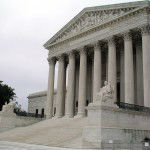Griswold v. Connecticut Back in the Spotlight As Birth Control Debate Resurfaces

Supreme Court decisions remain relevant long after they are decided, often setting legal precedent for years and even decades. The landmark decision of Griswold v. Connecticut, 381 U.S. 479 (1965), is a perfect example. Vice President Joe Biden referenced the case in a speech at a political fundraiser I attended earlier this month in New Jersey. He was responding to comments by Republican presidential candidate Rick Santorum suggesting that the case was decided incorrectly.
In Griswold, the Supreme Court affirmed the right of married couples to use contraception. The Court later extended that right to unmarried couples in Eisenstadt v. Baird, 405 U.S. 438 (1972). Together, the cases ultimately paved the way for the Supreme Court’s decision regarding abortion in Roe v. Wade, 410 U.S. 113 (1973).
The Facts of the Case
While it may seem unbelievable to us now, the use of contraception was banned in the state of Connecticut in 1965. The Connecticut law stated, “Any person who uses any drug, medicinal article or instrument for the purpose of preventing conception shall be fined not less than fifty dollars or imprisoned not less than sixty days nor more than one year or be both fined and imprisoned.” The law further criminalized the disbursement of birth control, stating, “Any person who assists, abets, counsels, causes, hires or commands another to commit any offense may be prosecuted and punished as if he were the principle offender.”
The case arose when Estelle Griswold, the executive director of Planned Parenthood League of Connecticut, and Dr. C. Lee Buxton, doctor and professor at Yale Medical School, were arrested and found guilty of violating the Connecticut law. They challenged the constitutionality of the law before the Supreme Court of Errors of Connecticut and later the U.S. Supreme Court.
The Supreme Court’s Decision
In a 7-2 decision authored by authored by Justice William O. Douglas, the Court struck down the ban on birth control, as it applied to married couples. In doing so, it recognized a fundamental “right to privacy” that had not been previously recognized by the Supreme Court.
In justifying the fundamental right to privacy, Justice Douglas argued that the Bill of Right’s specific guarantees have “penumbras,” created by “emanations from these guarantees that help give them life and opinion.” He subsequently highlighted several amendments—including the First Amendment guarantee of free speech, the Fourth Amendment protections against unreasonable searches and seizures, and the Fifth Amendment self-incrimination clause—that support a general right to privacy.
The Supreme Court further held that pursuant to the Fourteenth Amendment, the states could not infringe that right without proper justification.
As the opinion eloquently states:
The present case, then, concerns a relationship lying within the zone of privacy created by several fundamental constitutional guarantees. And it concerns a law which, in forbidding the use of contraceptives, rather than regulating their manufacture or sale, seeks to achieve its goals by means having a maximum destructive impact upon that relationship. Such a law cannot stand in light of the familiar principle, so often applied by this Court, that a ‘governmental purpose to control or prevent activities constitutionally subject to state regulation may not be achieved by means which sweep unnecessarily broadly and thereby invade the area of protected freedoms.’ NAACP v. Alabama, 377 U.S. 288, 307. Would we allow the police to search the sacred precincts of marital bedrooms for telltale signs of the use of contraceptives? The very idea is repulsive to the notions of privacy surrounding the marriage relationship.
The Future of Griswold
Prior to the current political season, the right to contraception was widely considered to be well-settled law. While it is improbable that the Griswold decision will be overturned, the Vice President’s speech last month and the discussion of this case in the Republican primary for President show that constitutional interpretation on issues that we often take for granted can always be revisited by people with different opinions.
Previous Articles
Supreme Court Rejects Moment of Threat Doctrine in Deadly Force Case
by DONALD SCARINCI on June 30, 2025
In Barnes v. Felix, 605 U.S. ____ (2025), the U.S. Supreme Court rejected the Fifth Circuit Court o...
SCOTUS Holds Wire Fraud Statute Doesn’t Require Proof Victim Suffered Economic Loss
by DONALD SCARINCI on June 24, 2025
In Kousisis v. United States, 605 U.S. ____ (2025), the U.S. Supreme Court held that a defendant wh...
SCOTUS Holds Wire Fraud Statute Doesn’t Require Proof Victim Suffered Economic Loss
by DONALD SCARINCI on June 17, 2025
In Kousisis v. United States, 605 U.S. ____ (2025), the U.S. Supreme Court held that a defendant wh...
The Amendments
-
Amendment1
- Establishment ClauseFree Exercise Clause
- Freedom of Speech
- Freedoms of Press
- Freedom of Assembly, and Petitition
-
Amendment2
- The Right to Bear Arms
-
Amendment4
- Unreasonable Searches and Seizures
-
Amendment5
- Due Process
- Eminent Domain
- Rights of Criminal Defendants
Preamble to the Bill of Rights
Congress of the United States begun and held at the City of New-York, on Wednesday the fourth of March, one thousand seven hundred and eighty nine.
THE Conventions of a number of the States, having at the time of their adopting the Constitution, expressed a desire, in order to prevent misconstruction or abuse of its powers, that further declaratory and restrictive clauses should be added: And as extending the ground of public confidence in the Government, will best ensure the beneficent ends of its institution.





